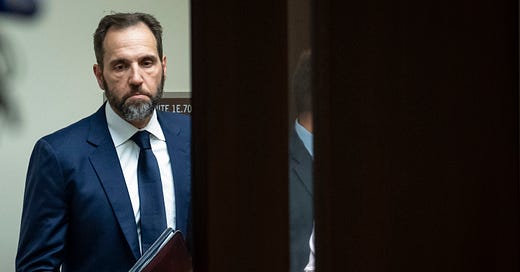
Trump Jan. 6th Trial Slowly Chugs Back to Life
But after the chaos caused by the Supreme Court, the road ahead for Jack Smith’s prosecution is unclear.

THE INEVITABLE CHAOS OCCASIONED by the U.S. Supreme Court’s ruling manufacturing immunity for presidents who commit crimes using their official power under Article II of the Constitution has officially begun.
On Friday, U.S. District Judge Tanya Chutkan held her first post-immunity ruling hearing in the criminal case in which Donald J. Trump is the sole defendant on charges relating to a massive conspiracy to overturn the election results and to obstruct the official proceedings in Congress on January 6th. On the docket was the issue of what to do about the SCOTUS majority’s decision, which created a multi-tiered test for determining what evidence, if any, can play a role in that prosecution given that Trump was still president during the ten weeks from November 2020 to January 2021 outlined in the indictment. The Court ruled that “core” acts like presidential pardons get immunity and cannot be used in a prosecution. Other “official” acts get a presumption of immunity that can only be overcome if the government can prove that charging former presidents using such evidence won’t somehow chill future presidents from taking actions as president. The majority offered no meaningful definitions or tests for how each step is supposed to operate.
Special Counsel Jack Smith argued that the court should hear an initial round of briefing to slice and dice the allegations in new four-count indictment, which Smith’s team reconfigured to paint Trump as acting as a candidate for office in connection with his myriad attempts to wrest the election from Joe Biden through a series of illegal acts. The Supreme Court majority held that this question is a threshold one, meaning it cannot be raised as a defense to an indictment—it must be decided before a single juror is empaneled.
Trump’s legal team retorted that they should be allowed to move to dismiss the indictment first rather than enable Smith to justify the revised indictment under Trump v. U.S. as a next step. Despite much speculation that the government would push for an evidentiary mini-trial this fall, Smith asked Chutkan to hear the issues based on written briefs, with attachments to relevant evidence, which Chutkan could decide to seal from the public for the time being.
Trump’s bid for a dismissal captures more than just the immunity decision. His lawyers also want to piggyback on U.S. District Judge Aileen Cannon’s ruling dismissing the Florida classified documents case against Trump altogether, on the spurious rationale that Smith’s appointment was itself unconstitutional. Trump’s attorney, John Lauro, told Chutkan that Justice Clarence Thomas in his concurring opinion in the immunity case “in effect directed us” to raise the issue in the January 6th case as well as the Mar-a-Lago one. Chutkan declined to take the bait, noting that Thomas’s musings were merely “dicta in a concurrence” and do not operate to supersede binding precedent to the contrary (meaning the unanimous 1974 decision in United States v. Nixon, which stated that the special prosecutor in the Nixon probe was lawfully appointed).
TRUMP’S TEAM ALSO PLANS TO SEIZE on another Supreme Court decision this term, Fischer v. U.S., which wiped out the Justice Department’s use of the Sarbanes-Oxley Act of 2022 to charge conspiracy in connection with January 6th, disrupting hundreds of cases brought against the January 6th rioters. Two of the four counts in the Trump indictment cite the same law.
These defense maneuvers are to be expected. The Supreme Court has handed Trump gift after gratuitous gift this year, including its March decision in Trump v. Anderson, which deactivated Section 3 of the Fourteenth Amendment, killing nationwide attempts to keep Trump off the ballot for having taken an oath to the Constitution and later engaging in insurrection within the meaning of that provision.
At the end of the day, both sides agreed with Chutkan that setting a trial date at this point would be an “exercise in futility” given how many hurdles the Supreme Court has erected for the prosecution and the inevitable piecemeal appeals back to that Court that will follow in the coming months and years.
So what’s coming next in the case? More motions and lengthy briefs and appeals on three questions: (1) whether any evidence of “non-official” acts exists at this point—a largely subjective question that the conservative justices will announce down the line, (2) whether Smith gets fired altogether, and (3) whether two of the four counts must be dismissed under Fischer. All of these issues stack in Trump’s favor, as do the inevitable delays.
Without a hint of irony, Lauro reportedly told Judge Chutkan that “we want an orderly process that does honor to the Supreme Court ruling,” because this is a “very sensitive time in our nation’s history.” The right-wing Supreme Court majority has taken the reins of prosecutorial power in these matters, for sure.
“I am an originalist,” said Lauro, insisting that the majority’s language is gospel.
Chutkan responded: “You may be an originalist, but I’m a trial judge.” Let’s see if she’s still able to do her job given all the meddling by the justices above her.
















